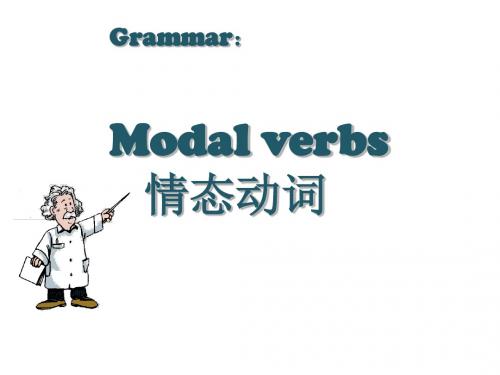情态动词基础课件
合集下载
情态动词(20张PPT)初中英语专项复习课件

看法。
(1)只作情态动词:must;can/could;may/might;ought to
(2)既可作情态动词又可作实义动词:need,dare
((34))既 具可 有作 情情 态态 动动词词某又些可特作征稿稿定助:定hPa动PPvTP,e词T/海h:量asd素ha材tlo持l;/s续hha更odublde;twteirll/would
【知识拓展】
1. must的一般疑问句,肯定回答为Yes, ...must.;否定回答为No, ...needn’t./No, ...don’t have
to.—Must I clean the classroom now? 我必须现在打扫教室吗?
—Yes, you must. 是的,你必须。/No, you don’t have to. /No, you needn’t. 不,你不必。
He promised he would never smoke again. 他承诺他再也不吸烟了。
Their English teacher would tell them stories in
表示过去反复发生的动 English after class.
作或某种倾向
他们的英语老师总是在课后用英语给他们讲故事
新,上千款模板选择总有一
款适合你
知识点二:情态动词的特点
情态动词的特点: (1)情态动词无人称和数的变化(have to除外); (2)情态动词后接动词原形; (3)情态动词的否定式是在其后加not; have to除外 (4)具有助动词的作用,可用来构成否定句、疑问句及用于简明答语; (5)个别情态动词有现在式和稿过定去PP式T两种形式,过去式用来表达更加客气、委 婉的语气,时态性不强,可稿用定于PPT过,海去量、素材现持在续更或将来。
(1)只作情态动词:must;can/could;may/might;ought to
(2)既可作情态动词又可作实义动词:need,dare
((34))既 具可 有作 情情 态态 动动词词某又些可特作征稿稿定助:定hPa动PPvTP,e词T/海h:量asd素ha材tlo持l;/s续hha更odublde;twteirll/would
【知识拓展】
1. must的一般疑问句,肯定回答为Yes, ...must.;否定回答为No, ...needn’t./No, ...don’t have
to.—Must I clean the classroom now? 我必须现在打扫教室吗?
—Yes, you must. 是的,你必须。/No, you don’t have to. /No, you needn’t. 不,你不必。
He promised he would never smoke again. 他承诺他再也不吸烟了。
Their English teacher would tell them stories in
表示过去反复发生的动 English after class.
作或某种倾向
他们的英语老师总是在课后用英语给他们讲故事
新,上千款模板选择总有一
款适合你
知识点二:情态动词的特点
情态动词的特点: (1)情态动词无人称和数的变化(have to除外); (2)情态动词后接动词原形; (3)情态动词的否定式是在其后加not; have to除外 (4)具有助动词的作用,可用来构成否定句、疑问句及用于简明答语; (5)个别情态动词有现在式和稿过定去PP式T两种形式,过去式用来表达更加客气、委 婉的语气,时态性不强,可稿用定于PPT过,海去量、素材现持在续更或将来。
情态动词语法讲解PPT课件

•You will wait outside the gate. •Brian! You will close the door.
b)表示“必然”,可用should,ought to和 must(一般用于陈述句),其中must口气最为 肯定。都指说话人根据一定情况做出推测或 判断.
•She should be here in a minute
•They must be home by now.(他们现在一定到家了)
will/would表示“推测”可有三种情况
1)对特定事态的推测
A: Who’s that man over there? B: That will be George, no doubt. C: That would be George, I except.
过去“能力”: could, was/were
able to
肯定句:
•Could:一般能力
• She could play the piano when she was only six.
• was/were able to(及managed to):具体 事件
• He was able to translate the article without a dictionary.
b)表示“可能”,可用may, might,
can, could
may/might:
1.既可以表示现在的可能,也可表示将来 的可能,might在口气上比may更委婉
• 现在:It may/might be true. • 将来:He may/might leave tomorrow.
2.在疑问句中,用can,不用may。
如果是推测过去的事态,则用must +have done
b)表示“必然”,可用should,ought to和 must(一般用于陈述句),其中must口气最为 肯定。都指说话人根据一定情况做出推测或 判断.
•She should be here in a minute
•They must be home by now.(他们现在一定到家了)
will/would表示“推测”可有三种情况
1)对特定事态的推测
A: Who’s that man over there? B: That will be George, no doubt. C: That would be George, I except.
过去“能力”: could, was/were
able to
肯定句:
•Could:一般能力
• She could play the piano when she was only six.
• was/were able to(及managed to):具体 事件
• He was able to translate the article without a dictionary.
b)表示“可能”,可用may, might,
can, could
may/might:
1.既可以表示现在的可能,也可表示将来 的可能,might在口气上比may更委婉
• 现在:It may/might be true. • 将来:He may/might leave tomorrow.
2.在疑问句中,用can,不用may。
如果是推测过去的事态,则用must +have done
《情态动词》PPT课件

work our this problem. 如果你睡个好觉,那么你就能做出这个题目。 3、表示过去的能力: could表示过去一般的能力, 但不表示做或未做某事;
was/ were able to表示过去有能力并且成功地做了某事, 相当于managed to do something/ succeeded in doing something;
• Mr. Bush is on time for everything. How can it be that he was late for the opening ceremony? (表疑惑、惊讶)
表示请求、允许、允诺
1. 当对方是决策者时,你代表你(们)自己(I, We),或代表第三者(he,she,they)向对方 (you)请示或提出建议时用:
Revision:Modal verbs
情态动词专项复习
How many modal verbs
do you remember?
(情态动词)
一,常见的情态动词有:can, could, may, might ,must, shall, should, will, would, need, have to等
4、具有情态动词的某些特征的有:have(had) to, used to.
情态动词的特征
1、有一定的词义,但不能单独作谓语,它们要和行 为动词或连系动词连用,构成谓语。
2、适用于主语的各种人称和数 have to例外,主语 是第三人称单数时,要用has to)。如:
We/ He must work hard. 我们/他一定要努力工作。 I have to walk home. 我得步行回家。 He has to walk home. 他得步行回家。
was/ were able to表示过去有能力并且成功地做了某事, 相当于managed to do something/ succeeded in doing something;
• Mr. Bush is on time for everything. How can it be that he was late for the opening ceremony? (表疑惑、惊讶)
表示请求、允许、允诺
1. 当对方是决策者时,你代表你(们)自己(I, We),或代表第三者(he,she,they)向对方 (you)请示或提出建议时用:
Revision:Modal verbs
情态动词专项复习
How many modal verbs
do you remember?
(情态动词)
一,常见的情态动词有:can, could, may, might ,must, shall, should, will, would, need, have to等
4、具有情态动词的某些特征的有:have(had) to, used to.
情态动词的特征
1、有一定的词义,但不能单独作谓语,它们要和行 为动词或连系动词连用,构成谓语。
2、适用于主语的各种人称和数 have to例外,主语 是第三人称单数时,要用has to)。如:
We/ He must work hard. 我们/他一定要努力工作。 I have to walk home. 我得步行回家。 He has to walk home. 他得步行回家。
情态动词专题知识公开课获奖课件

第7页
②在予以他人许可时,常用can,但有时也用may。不能用 might。
-May I play basketball this afternoon? 今天下午我可以打篮球吗? -Yes,you may. 行,可以。
第8页
(2)表达也许性 may和might表达也许性时,可以对目前、过去或未来进行 推测。 Peter may e with us tonight,but he isn't sure yet. 彼得今晚也许和我们一起来,但他还没确定。 He might be studying in the classroom. 他也许正在教室里学习。
用于必定句,表示对
taken the other road.It might have
过去没有做某事遗憾,意思 been quicker.可能我们本应走另一
should/ou 为“原来能够……(但实际 条路,那样可能更加快些。
第17页
(3)用于法律、公约、约定等正式条文,重要用于第三人称。 Students shall remain in their seats until all the papers have been collected. 试卷所有收回后学生方可离开座位。
第18页
5. will和would使用措施 作情态动词will,would与作助动词will,would多种形式相 似。 (1)表达自愿做或积极提出做什么,如意志、愿望或决心等。 would用于过去状况。
第14页
The TV set is broken. I have to buy a new one. 电视机坏了。我不得不再买台新。 The students will have to know how to use the puters. 学生将必须理解怎样使用电脑。 He had to go,because his mother was ill. 他不得不离开,由于他母亲病了。
②在予以他人许可时,常用can,但有时也用may。不能用 might。
-May I play basketball this afternoon? 今天下午我可以打篮球吗? -Yes,you may. 行,可以。
第8页
(2)表达也许性 may和might表达也许性时,可以对目前、过去或未来进行 推测。 Peter may e with us tonight,but he isn't sure yet. 彼得今晚也许和我们一起来,但他还没确定。 He might be studying in the classroom. 他也许正在教室里学习。
用于必定句,表示对
taken the other road.It might have
过去没有做某事遗憾,意思 been quicker.可能我们本应走另一
should/ou 为“原来能够……(但实际 条路,那样可能更加快些。
第17页
(3)用于法律、公约、约定等正式条文,重要用于第三人称。 Students shall remain in their seats until all the papers have been collected. 试卷所有收回后学生方可离开座位。
第18页
5. will和would使用措施 作情态动词will,would与作助动词will,would多种形式相 似。 (1)表达自愿做或积极提出做什么,如意志、愿望或决心等。 would用于过去状况。
第14页
The TV set is broken. I have to buy a new one. 电视机坏了。我不得不再买台新。 The students will have to know how to use the puters. 学生将必须理解怎样使用电脑。 He had to go,because his mother was ill. 他不得不离开,由于他母亲病了。
我的公开课情态动词课件

2. —What’s the name of the book? —Khulaifi. _________ I spell it for you? A. Shall B. Would C. Can D. Might
情态动词表必要性
• must • need
高考真题演练
must 表“必须”
mustn’t 禁止
A. might B. must C. would D. can
3. What do you mean, there are only ten tickets? There ______ be twelve.
A. should B. would C. will D. shall
4. It is usually warm in my hometown in March, but it _____ be rather cold sometimes.
1. 不必须
don’t have to needn’t do
don’t need to
2. must还可表示“偏偏、偏要” e.g. Must you make so much noise?
• You ___ buy a gift, but you can if you want to.
• must
1. 常用于否定句或疑问句。 e.g. You can’t be hungry already — you had
lunch only two hours ago!
2. can用于肯定句中表示理论上的可能性,并不 牵涉是否真的会发生
e.g. You can hurt yourself if you play in the street.
A. must B. can C. should D. would
情态动词-完整版PPT课件

情态动词 modal verbs
1.情态动词的用法特点
1)情态动词 除 ought 和 have 外,后面只能 接不带to 的不定式。 2)情态动词没有人称,数的变化,即情态动 词第三人称单数不加-s。 3)情态动词没有非谓语形式,即没有不定式, 分词等形式。
can could may might shall should must will would ought to
have to dare need used to
表示推测
情态动词
不表示推测
2.表示推测——情态动词的重要用法.
情态动词
对将来
对现在
对过去
m肯ust/定sho的uld 推测
+ V. + V. + have done
常见must be + be doi定的推测 can’t, couldn’t
疑问的推测
can, could
+ V.
+ V.
+ have done
+ be doing
可以用not表示“可能不”
+V.
+ V.
+ have done
+ be doing
+ V.
+ V.
+ have done
+ be doing
不同的“肯定”程度可按下列层次排列: He is at home. (事实) He must be at home.(非常肯定的推断) He ought to be at home.(很可能) He could be at home.(很可能) He may be at home.(仅仅可能而已) He might be at home.(或许, 非常不确定) He might not be at home.(也许不在家) He may not be at home. (比might可能) He couldn’t be at home.(很可能不在家) He can’t be at home.(一定不在家)
1.情态动词的用法特点
1)情态动词 除 ought 和 have 外,后面只能 接不带to 的不定式。 2)情态动词没有人称,数的变化,即情态动 词第三人称单数不加-s。 3)情态动词没有非谓语形式,即没有不定式, 分词等形式。
can could may might shall should must will would ought to
have to dare need used to
表示推测
情态动词
不表示推测
2.表示推测——情态动词的重要用法.
情态动词
对将来
对现在
对过去
m肯ust/定sho的uld 推测
+ V. + V. + have done
常见must be + be doi定的推测 can’t, couldn’t
疑问的推测
can, could
+ V.
+ V.
+ have done
+ be doing
可以用not表示“可能不”
+V.
+ V.
+ have done
+ be doing
+ V.
+ V.
+ have done
+ be doing
不同的“肯定”程度可按下列层次排列: He is at home. (事实) He must be at home.(非常肯定的推断) He ought to be at home.(很可能) He could be at home.(很可能) He may be at home.(仅仅可能而已) He might be at home.(或许, 非常不确定) He might not be at home.(也许不在家) He may not be at home. (比might可能) He couldn’t be at home.(很可能不在家) He can’t be at home.(一定不在家)
中职英语语法情态动词教学课件

2.表示推测时,could不是过去式,只是语气更委婉;若是推测已发生的事或过去的情况, 用can/could have done
3.can和be able to辨析 can(could)和be able to都可以表示能力,意思上没有区别。但can只有现在式和过去式, 而be able to则有更多的形式。如:
表示猜测(不可能)
➢7. They (can not/may not) __c_a_n_n_o_t________ still be out, the light is on in the house.
➢8. You (couldn’t/might not) 表示许可 ____c_o_u_ld__n_’t_______ smoke on the bus.
则在助动词之前。疑问句中, 情态动词放在主语之前。 I can see you. Come here. 我能看见你,过来吧。 He must have been away. 他一定走了。 What can I do for you? 你要什么? How dare you treat us like that! 你怎么敢那样对待我们!
三.shall和should
情态动词
用法
例句
shall
用于第一、三人称构成的疑问 1. Shall I open the window?
句,表示征求对方意见或请求 2. Shall we say 6 o’clock, then?
指示,其意为“要不要”、“… 3. Shall he come to see you? 好吗”:
I’ve always wanted to be able to speak fluent English. Those bags look really heavy, are you sure you’ll be able to carry them on your own?
3.can和be able to辨析 can(could)和be able to都可以表示能力,意思上没有区别。但can只有现在式和过去式, 而be able to则有更多的形式。如:
表示猜测(不可能)
➢7. They (can not/may not) __c_a_n_n_o_t________ still be out, the light is on in the house.
➢8. You (couldn’t/might not) 表示许可 ____c_o_u_ld__n_’t_______ smoke on the bus.
则在助动词之前。疑问句中, 情态动词放在主语之前。 I can see you. Come here. 我能看见你,过来吧。 He must have been away. 他一定走了。 What can I do for you? 你要什么? How dare you treat us like that! 你怎么敢那样对待我们!
三.shall和should
情态动词
用法
例句
shall
用于第一、三人称构成的疑问 1. Shall I open the window?
句,表示征求对方意见或请求 2. Shall we say 6 o’clock, then?
指示,其意为“要不要”、“… 3. Shall he come to see you? 好吗”:
I’ve always wanted to be able to speak fluent English. Those bags look really heavy, are you sure you’ll be able to carry them on your own?
情态动词(12张PPT)初中英语专项复习课件

例句
可能性
The storybook could be Jim’s. He likes reading
小
could 很可能 stories.这本故事书很可能是吉姆的,他喜欢读故
事。
This book must be Lucy’s, for her name is on the must 一定 cover.这本书一定是露西的,因为封面上有她的名 大
态 动
had better 最好,用来提出建议
today.
词
情态动词的基本含义
分析近三年中考真题可知,情态动词的基本用法是中考必考点,考生需 掌握各个情态动词的基本含义(见"考点帮")。
在答题时,应注意结合语境,并考虑常见句型。 常考情态动词有can、may和must及情态动词的否定形式needn’t、
基 本 句
②可能,也许,表示推
They might laugh at me.
型
might 测
情
态 动 词
常 见 情
①必须,表示命令或主观 看法
—Must I finish the homework today? —No, you needn’t/don’t have to. He must be staying here.
基
①能,会,表示能力
I can sing.
本
②可能,表示推测,常用于否定句和疑 Can it be right?
句
问句
型
can ③可以,表示许可和征求对方意见
Can you help me?
情
①能,会,can的过去式,表 I could do it.
态
常
过去的能力
高中英语 H__情态动词课件 新人教版必修4

3) must+ v
He must be at the library.
can’t+ v
第十页,共86页。
4) Must用语肯定句中表示“偏偏”。 Naturally, after I told her what to do, my daughter
must go and do the opposite. 自然地,在我交代女儿做什么之后,她偏偏要做相反
Whenever we were in the country, we
_____w_o_u_l_d____play hide-and-seek in the fields.
2.表示过去的状态,只能用 used to,不可用would。例 如:
There ____________ be a park.
of our hotel that payment ____ be made in
cash.
A、shall B、need
A C、will D、can
第二十页,共86页。
8. shall / should/ ought to
shall
1)What shall we do now?
Shall she come right now?
第十二页,共86页。
B She is a bit shy and _____ stand up and
answer the teacher's questions.
A.dares not
B.doesn't dare to
C.dare not to
D.dares not to
I wonder how he _A__ to his father like
情态动词专项课件

2.may/might
(1)(表准许、请求)可以……(might比may语气 更委婉)
You may go home now,Susan. May I have a word with you,please? (2)(表愿望、祝福)但愿;祝……。此时,句
子要用倒装语序。 May you succeed!祝你成功! (3)句型:may/might as well do sth. “还是做 某事的好;不妨去做某事” Since we’ve got nothing to do,we might as
That window wouldn’t /won’t open.
• 7.need与dare的用法
• (1)need表示“需要,必要”之意。作情态动词, 仅用于否定句和疑问句中,且只有现在时,其他 时态用have to的相应形式代替。dare表示“敢, 敢于”之意。作情态动词时,主要用于疑问句、 否定句和条件从句,一般不用于肯定句中。
• (2)need作实义动词时: sb need sth/ to do sth; sth need doing/ to be done
• (3) dare作实义动词时:dare + to do(肯定句); dare + (to) do(否定句和疑问句)
情态 动词
can (could)
二、情态动词表示推测
越……越好;非常……”。 One cannot be too careful. 越认真越好。 I cannot thank you enough.我对你感激不尽。 ②cannot help doing.../cannot help but do.../
cannot but do...“禁不住;不由得;不得不”。
高中英语情态动词各种用法课件(共47张PPT)

一 、表能力 :表现在的或一般的能力:表示 现在的或一般的能力用can 或 be able to. 一 般的能力是指你无论什么时候做什么事情就 能做到的能力。表示现在的能力或一般的能 力时,can比be able to 更普遍。
A computer can’t think for itself; it must be told what to do. (表示一般的能力)
This can’t / couldn’t be done by him. (表示不 相信)
He could be on his way home now. (could 不 如 may / might常用)
Can this be done by him? (表示一种疑惑、 惊讶)
(3)would, could, should, might 并不一定 与过去的时间有关,而是表示可能性弱于他 们相应的现在形式。如:
do something / succeeded in doing sth.
The fire spread through the hotel very
quickly but everyone was able to get out. (过去有能力并成功地做了某事)
(3) could have + 过去分词,表示过去有 能力做但未做。
表示对过去已经发生的行为进行推测,意为 “想必 / 准是/ 一定做了某事
It must have rained last night, for the road was quite muddy.
The lights were out. They must have been asleep.
2. can have done
情态动词can的用法课件

情态动词表示说话人对某一动作 或状态的态度或看法,包括可能 性、必要性、意愿等。
特点
情态动词没有人称和数的变化, 其后必须接动词原形。
情态动词分类
可能性情态动词
can, could, may, might
必要性情态动词
must, should, ought to
意愿性情态动词
will, would, shall, should
混淆can与may的用法
03
can表示能力和可能性,而may表示推测或允许,两者在语境中
应区分使用。
情态动词can拓展知识点
情态动词can的过去式
could,用法与can相似,但语气更委婉。
情态动词can与其他情态动词连用
如“You should can do it.”(你应该能做到。)表示强调。
用could表示推测与猜测
要点一
could用于推测过去或现在
could是can的过去式,但也可以用于表示对现在或过去的 推测,例如,“He could be busy.”(他可能很忙。)
要点二
could表示猜测的语气
与can相比,could表示的猜测语气更为委婉或不确定,通 常用于表示基于不完全信息或主观判断的推测,例如, “It could be a good idea.”(这可能是个好主意。)
情态动词can的用法课件
目录
CONTENTS
• 情态动词can基本概念 • 情态动词can表示能力 • 情态动词can表示可能性与推测 • 情态动词can与其他情态动词比较 • 情态动词can在特殊句型中的运用 • 情态动词can总结与拓展
01
CHAPTER
情态动词can基本概念
特点
情态动词没有人称和数的变化, 其后必须接动词原形。
情态动词分类
可能性情态动词
can, could, may, might
必要性情态动词
must, should, ought to
意愿性情态动词
will, would, shall, should
混淆can与may的用法
03
can表示能力和可能性,而may表示推测或允许,两者在语境中
应区分使用。
情态动词can拓展知识点
情态动词can的过去式
could,用法与can相似,但语气更委婉。
情态动词can与其他情态动词连用
如“You should can do it.”(你应该能做到。)表示强调。
用could表示推测与猜测
要点一
could用于推测过去或现在
could是can的过去式,但也可以用于表示对现在或过去的 推测,例如,“He could be busy.”(他可能很忙。)
要点二
could表示猜测的语气
与can相比,could表示的猜测语气更为委婉或不确定,通 常用于表示基于不完全信息或主观判断的推测,例如, “It could be a good idea.”(这可能是个好主意。)
情态动词can的用法课件
目录
CONTENTS
• 情态动词can基本概念 • 情态动词can表示能力 • 情态动词can表示可能性与推测 • 情态动词can与其他情态动词比较 • 情态动词can在特殊句型中的运用 • 情态动词can总结与拓展
01
CHAPTER
情态动词can基本概念
专题09 情态动词【课件】-2023年中考英语考前冲刺语法图解过关

提分特训
肯定 含义
例句
The storybook could be Jim’s. He likes reading could 很可能 stories.这本故事书很可能是吉姆的,他喜欢读故
事。
可能性 小
This book must be Lucy’s, for her name is on the must 一定 cover.这本书一定是露西的,因为封面上有她的名 大
词
表示命令、警告、允 She shall be punished.(威胁)
shall 诺、威胁或决心等
语法图解
基 本 句 型
情 态常 动见 词情
态 动 词
①表示祝愿
I hope you will enjoy yourselves.
②表示请求 will,
Would you help me carry the desk? Flowers will die out of water.
满分秘籍
巧学妙记
提分特训
4.(2022·广西·中考真题)— ________ you tell us a story in
English? —I think I can do it. Let me try.A.Need
B.Can C.Should
D.Must
【答案】B 【解析】句意:——你能用英语给我们讲个故事吗?——我 想我可以。让我试一下。考查情态动词。Need需要;Can能; Should应该;Must必须。根据“I think I can do it.”可知我想我能 做到。故选B。
满分秘1籍1.(2022·江苏常州·中考真巧题学)妙T记o achieve
our
dream,
- 1、下载文档前请自行甄别文档内容的完整性,平台不提供额外的编辑、内容补充、找答案等附加服务。
- 2、"仅部分预览"的文档,不可在线预览部分如存在完整性等问题,可反馈申请退款(可完整预览的文档不适用该条件!)。
- 3、如文档侵犯您的权益,请联系客服反馈,我们会尽快为您处理(人工客服工作时间:9:00-18:30)。
can/could have done
may/might have done
可能做了
可能做了
needn’t have done
不需要做但做了
1) You____ all those clothes! We have a washing machine to do that sort of thing. A) needn't have washed B) shouldn't have washed C) must not have washed D) can not have washed 2) John„s score on the test is the highest in the class, he____ last night. A) should study B) should have studied C) must have studied D) must have to study
9)“We didn't see him at the exhibition yesterday.” “He ___it.” A) mustn't visit B) can't have visited C) should have gone to see D) may see
10) Mary ____my letter, otherwise she would have replied before now. A) should have received B) has received C) couldn't have received D) ought to have received 11) I ____ you a valuable present for your birthday, but I was short of money. A) would have liked to give B) liked to give C) have liked to give D) would like to give
情态动词
can could may might must have to dare need shall should ought to will would had better
1.没有人称和数的变化 2.部分有过去式的变化 can could might
may
shall will have to dare
6) I am feeling sick. I____ so much chocolate. A) needn't have eaten B) couldn't have eaten C) mustn't have eaten D) shouldn't have eaten 7) I didn't send out my application form last week, but I ____. A) had B) would do C) should have D) might have to 8) She can speak quite fluent English. She____. A) must been in the U.S.A. for some time B) must have been in the U.S.A. for some time C) should have been in the U.S.A. for some time D) May be in the U.S.A. for some time
3) Nobody knows how people first came to these islands. They ____ from South America on rafts. A) must have sailed B) can sail C) might have sailed D) should have sailed 4) We____ the letter yesterday, but it didn't arrive. A) must receive B) ought to receive C) must have received D) ought to have received 5) With all the work on hand, he____ to the cinema last night. A) mustn„t go B) shouldn‟t have gone C) could not go D) couldn't have gone
12)“Where ____ my umbrella?”“Somebody ____ it away by mistake.” A) is, must have taken B) is, must take C) have been, must take D) is, takes
13) What ____ would happen if the director knew you felt that way? A) will you suppose B) you suppose C) do you suppose D) yuld
would
had to
dared
表请求: can,could,may,might,must 表允许: 表猜测:
can,could,may ,might
must,can,could,may,might
should,ought to,had better,must,have 表建议: to,shall,will,would
17) Tom ____ better than to ask Dick for help. A) shall know B) shouldn't know C) has known D) should have known
18) I know things are hard with you, but you ____try to get over the difficulties. A) can B) may C) must D) ought 19 I can't find the recorder in the room. It ____ by somebody. A) may have been taken away B) may leave C) may take away D) must have taken away 20) He ____the 9:20 train because he didn't leave home till 9:25. A) can reach B) could catch C) may not catch D) couldn't have caught
表意愿: will,would 表能力: can,could, be able to
既可以作为情态动词又可以做为实意动词:
敢于
dare need
需要
should /ought to have done
本该做(实际没有做)
should not/ ought not to have done本不该做(但做了) must have done can’t have done 一定做过 一定没有做
14) Two eyes ____see more than one. A) can B) may C) will D) should
15) ____ you continue in your efforts and achieve new and greater successes. A) Would B) Will C) May D) Should 16) We ought to help each other in our work, ____? A) oughtn't we B) should we C) shouldn't we D) ought to we
